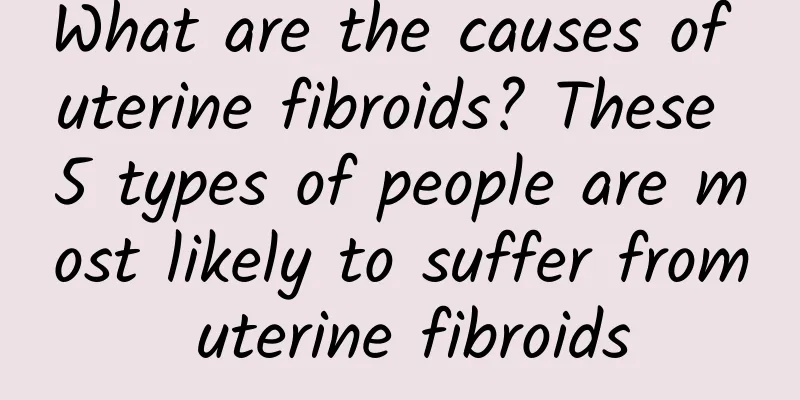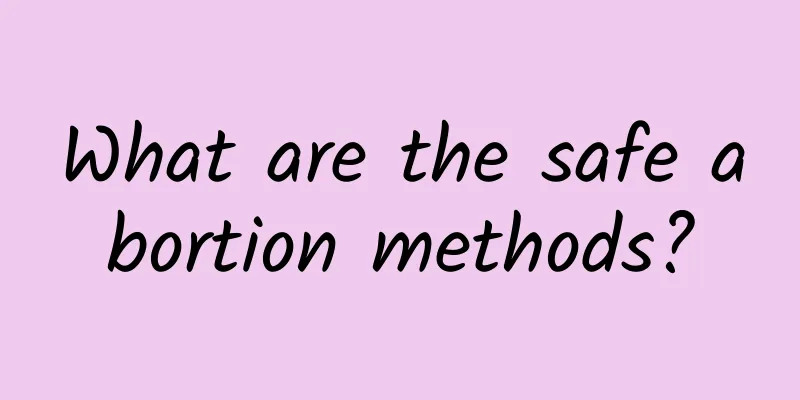What are the causes of uterine fibroids? These 5 types of people are most likely to suffer from uterine fibroids

|
Uterine fibroids are the most common benign tumors of the female genitals. They are mainly caused by certain factors and can grow lumps on the uterine wall. According to Professor Chen Chunlin of the Department of Obstetrics and Gynecology at Nanfang Hospital, about 20% of women over 30 years old suffer from uterine fibroids, and the incidence rate is highest in the five groups of people, who need special attention. So, what factors are more likely to cause uterine fibroids? The first category is people who are affected by genetic factors, which are manifested as racial differences and family aggregation. For example, the incidence rate of blacks is 3 times higher than that of whites or Asians, and the incidence rate of immediate relatives or sisters with uterine fibroids is 4.2 times higher than that of people without a family history. The second category is people with diseases that cause ovarian hyperfunction, such as polycystic ovary syndrome; there are also diseases with ovarian endocrine function, such as granulosa cell tumor and ovarian granulosa cell tumor, which can cause uterine fibroids. The third category is related to childbirth. The incidence of uterine fibroids is inversely proportional to childbirth. Nowadays, elderly people in their 70s have at least four children, which explains why women rarely suffered from this disease in the past. This is because the ovaries do not ovulate in October, and hormone secretion is at a low level to protect the health of the uterus. The fourth category is affected by physical health. Why do sisters get sick when eating the same food? This is related to personal constitution. Since hormones require receptors, some people are more sensitive and more susceptible to hormones, so they are relatively prone to uterine fibroids. The fifth category is related to life. The first is obesity. Studies have shown that because obese people are more likely to synthesize estrogen, the risk of developing fibroids increases by 21% for every 10 kg increase in weight. Birth control pills cause uterine fibroids However, due to the influence of certain factors, such as excessively high estrogen levels, the intervention of certain growth factors, etc., lumps may grow on the uterine wall, which are often called uterine fibroids. Uterine fibroids are the most common benign tumors of the female genitalia: Studies have found that about 20% of women aged 30 to 50 suffer from uterine fibroids, and the number has been increasing in recent years. Although uterine fibroids are benign tumors, most symptoms are not obvious, but if not discovered in time, they will endanger multiple organs of the body and cause infertility, so early prevention and early treatment are very necessary. Uterine fibroids can be clinically divided into the following three types according to their location: intramural fibroids located in the myometrium are the most common, accounting for 60% to 70% of the total; fibroids that grow in the uterine serosa and protrude from the surface of the uterus are called subserosal fibroids, accounting for 20% to 30% of the total; fibroids that grow in the mucosal layer and protrude into the uterine cavity are called submucosal fibroids, accounting for 10% to 15% of the total. Uterine fibroids vary greatly in size, ranging from small ones that cannot be distinguished by the naked eye to large ones that weigh dozens of kilograms. What are the common symptoms of uterine fibroids? The most common symptom of patients with uterine fibroids is menstrual changes: such as shortened menstrual cycles, prolonged menstrual cycles, or increased menstrual volume, especially heavy bleeding in a short period of time, which can lead to severe anemia. When the fibroids grow larger, they can compress adjacent organs, causing frequent urination, constipation, hydroureter, hydronephrosis, etc. Fibroids are generally painless, but if the pedicle of the subserosal fibroid is twisted, it can cause acute abdominal pain; submucosal fibroids can stimulate contraction, spasmodic pain, and red degeneration, which can cause severe pain. Uterine fibroids can also cause increased leucorrhea and infertility. Some people do not feel any discomfort because they are found to have uterine fibroids during a physical examination or B-ultrasound gynecological examination. What are the commonly used treatments for uterine fibroids? 1. Conservative treatment: If the fibroid is not large (the uterus is smaller than two months of pregnancy), the symptoms are not obvious, and follow-up can be done in the outpatient clinic for three to six months; 2. Myoma excavation: If there is a strong desire to have children or the patient and his/her family members insist on uterine preservation, it can be performed under laparoscopy; 3. Hysterectomy: The patient is older, has severe symptoms, has no desire to continue having children, or has severe anemia that affects the function of other organs; 4. Interventional treatment: insert a catheter into the uterine artery and inject an embolic agent to occlude the fibroid blood vessels. This method is accurate and is another way to treat uterine fibroids. |
<<: How are uterine fibroids induced? What are the methods to prevent uterine fibroids?
Recommend
How to treat cervical hypertrophy
Cervical hypertrophy is usually related to chroni...
Can I eat mutton after uterine fibroid surgery? Are most uterine fibroids benign?
Generally, clinical patients should pay attention...
Is pelvic effusion necessary for pelvic therapy?
Pelvic effusion can cause backache, lower abdomin...
What causes candidal vaginitis?
Vaginal candidiasis is a common vaginal inflammat...
What are the methods of treating uterine fibroids?
When it comes to uterine fibroids, many friends a...
How much suffering do uterine fibroids cause women?
In recent years, uterine fibroids have frequently...
Warning: Three common high-risk groups for ectopic pregnancy
It is very necessary for female friends to unders...
Secret recipe for quick weight loss! Jennifer Aniston eating pureed vegetables
Recently in the popular Hollywood comedy "Mc...
What are the causes of endometriosis?
Endometriosis can infiltrate surrounding tissues ...
What can you eat to make uterine fibroids disappear? What can you eat to make uterine fibroids disappear? Tips
What can you eat to make uterine fibroids disappe...
What are the dangers of malignant uterine fibroids?
What are the hazards of malignant uterine fibroid...
What to eat during menopause - healthy recipes
Women in menopause will gradually experience a de...
How to treat moderate cervical erosion
If cervical erosion is found to be moderate and w...
Commonly used examination methods for menstrual irregularities during adolescence
Girls will have their periods when they reach pub...
What harm can cervical warts cause to the body
Cervical warts are a very difficult disease to tr...









